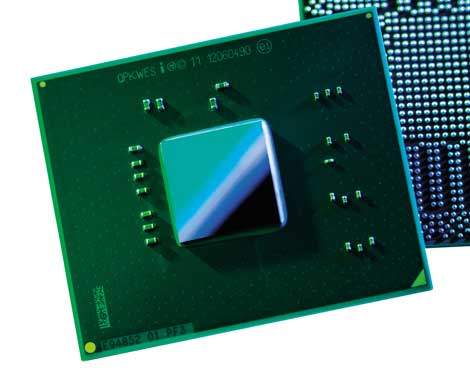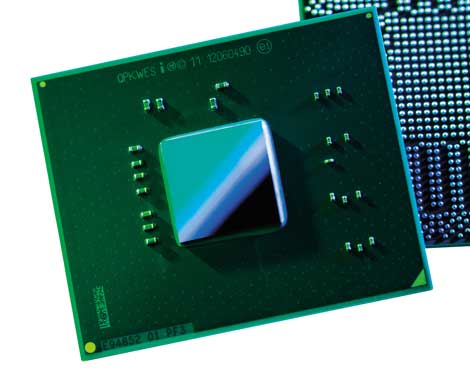Intel Unveils Low-Power Atom Chips for Servers
Intel's first Atom server-class processor has arrived, and several major hosting companies say they're ready to start filling their racks with servers using the low-power chips. The Atom S1200 features a 64-bit system-on-chip (SOC) that uses as little as 6 watts per processor.
December 11, 2012


Intel-AtomS1200chip2
The new Intel Atom S1200 offers a system-on-chip design that uses just 6 watts of power (Photo: Intel Corp.)
Intel's first Atom server-class processor has arrived, and some major hosting companies say they're ready to start filling their racks with servers using the low-power chips. The Atom S1200 features a 64-bit system-on-chip (SOC) that uses as little as 6 watts per processor.
Today's announcement is the latest milestone in the ongoing push to reduce energy usage in data centers, which has prompted server vendors to adapt low-power smartphone chips for the server market, including both Intel's Atom and chips from ARM that are widely used in iPhones and iPads. It continues the development of both "brawny" and "wimpy"cores for different types of computing tasks within the data center, a trend that provides end users with additional options for matching processors with workloads to find the best economics and performance.
"Our strategy continues to be to address all the workloads in the data center," said Diane Bryant, vice president and general manager of the Datacenter and Connected Systems Group at Intel, who said the S1200 could allow end users to pack as many as 1,000 cores into a standard rack. "As more and more workloads emerge, we're committed to providing the optimal solution for any given workload."
The SoC includes two physical cores and a total of four threads, 64-bit support, a memory controller supporting up to 8GB of DDR3 memory, up to eight lanes of PCI Express 2.0, and Error-Correcting Code (ECC) support for higher reliability. The new product family will consist of three processors with frequency ranging from 1.6GHz to 2.0GHz.
Ideal for 'Light Scale-Out' Workloads
With today's announcement, Intel meets its announced timetable to offer a commercial version of the Atom "Centerton" processor in the fourth quarter of 2012. The chip has been in use by early adopters including HP, which has made Atom the focus of the "Gemini" line of servers within its broader Project Moonshot initiative to build low-power next-generation servers.
"One size no longer fits all," said Paul Santeler, VP of the Hyperscale Business Unit at HP, who said the new Atom servers are ideal for "light scale-out" workloads including content delivery, caching technologies like memcached, and some "big data" processing requirements. Bryant cited dedicated hosting as a promising area for the use of Atom, and HP has deployed its Gemini with hosting customers.
"Based on what we have seen so far, HP appears to have developed a highly efficient solution with the Intel Atom S1200 product family that is deal for light scale-out workloads," said Marc Burkels, manager of dedicated servers and colocation at LeaseWeb in Amsterdam. "LeaseWeb continuously innovates in its own product pottfolio and services, and is always looking for energy-efficient solutions. That's why we tested an HP Gemini beta system, and compared it with our dedicated server products."
Not the First Atom Servers
Atom chips have been used in production servers by companies who proceeded without a commercial product release from Intel. These included SeaMicro (which was acquired by Intel rival AMD) and France's OVH Hosting, which builds its own custom servers.
"We already sell lots of Atom-based systems, but the added reliability features and virtualization support of the Atom processor S1200 will expand the market for lowest-power dedicated servers," said Miroslaw Klaba, Director of R&D at OVH. "The power efficiency of this new platform will allow OVH to double the density of our entry-level server designs and to offer our customers unmatched flexibility and TCO."
Hosting companies aren't the only interested customers. Facebook hardware honcho Frank Frankovsky was on hand at the Intel briefing to discuss the merits of low-power systems to customers like Facebook.
"We're facing unprecedented scale requirements," said Frankovsky. "That's why we're excited about promoting this move to system-on-chip. You really dramatically drop the power required. We believe this is going to use one-half to one-third the watts (as Xeon)."
Facebook has tested many-core designs from other vendors, including Tilera. Some of the original design manufacturers getting big business from the hyperscale universe were identified as among the server builders that have developed designs incroproating the S1200, including Huawei, Quanta and Wiwynn.
When asked about competition from ARM -based offerings, Bryant noted that "today there are no ARM-based enterprise servers, so that it not an apples-to-apples comparison. We believe we have a good view into competing processors and we have an advantage and a compelling solution."
About the Author
You May Also Like







